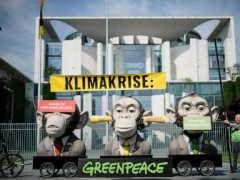A North Dakota jury on Wednesday found Greenpeace must pay hundreds of millions of dollars to a pipeline company in connection with protests against the Dakota Access oil pipeline.
The jury found Greenpeace liable for defamation and other claims and awarded Dallas-based Energy Transfer and subsidiary Dakota Access more than $650 million in damages.
The lawsuit accused Netherlands-based Greenpeace International, Greenpeace USA and funding arm Greenpeace Fund Inc. of defamation, trespass, nuisance, civil conspiracy and other acts.
Greenpeace said earlier that a large award to the pipeline company would threaten to bankrupt the environmental group. Following the nine-person jury’s verdict, Greenpeace’s senior legal adviser said the organization’s work “is never going to stop.”
The independent global campaigning network has been fighting for a wide array of environmental issues for more than half a century and has a long history of contentious legal battles.
Here are some things to know:
Environmental activists founded the group in Vancouver, Canada, in 1971.
The network’s first action was to work to stop more nuclear weapons tests on Amchitka Island in the Aleutian island chain in southwest Alaska. They took a ship toward the island to “bear witness,” which is a Quaker protest tradition, but were intercepted by the U.S. Navy, according to the Greenpeace website.
The U.S. later opted to abandon their nuclear testing grounds on the island, marking Greenpeace’s first major victory.
During initial work to stop the nuclear weapons tests on Amchitka, Canadian ecologist Bill Darnell was leaving one of the group’s meetings when someone held up two fingers and said “peace!” according to Greenpeace’s website.
Darnell, who i





